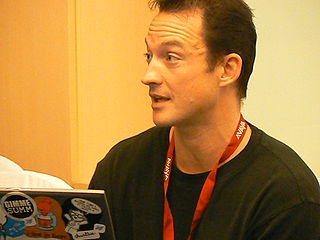A Quote by Leland Ryken
My claim is simply that the literary approach is one necessary way to read and interpret the Bible, an approach that has been unjustifiably neglected. Despite that neglect, the literary approach builds at every turn on what biblical scholars have done to recover the original, intended meaning of the biblical text.
Related Quotes
It's important for people in the Church to realize that the way they talk and think about the Bible isn't the way Bible scholars talk and think about it - and I'm including "Bible-believing" scholars there. There is a wide gap between the work of biblical scholars, whose business it is to read the text of the Bible in its own worldview context, and what you hear in church.
Archaeology in general is the recovery and study of the material culture of past civilizations. Biblical archaeology is as an application of the science of archaeology to the field of biblical studies. Through the comparison and integration of Scripture with the evidence of history and culture derived from archaeology, new insights into the biblical context of people and events, and sometimes the interpretation of the text itself, are possible. In this way archaeology serves as a necessary tool for biblical exegesis and for apologetic concerns.
Biblical archaeology was developed early in this century in an effort to substantiate the authenticity of the Biblical account. It's by now generally recognized in Biblical scholarship that it has done the opposite. The Bible is not a historical text, and has only vague resemblances to what took place, as far as can be reconstructed. For example, whether Israel ever existed is not clear; if so, it was probably a small kingdom somewhere in the hills, apparently virtually unknown to the Egyptians.
My approach is not a scientific approach. For that, we have greater minds than mine. My approach is: I am in the possession of a text, it has survived so many centuries, and it is my task, my pleasure, to try to decipher it and find all the things that have been said about these few words by generations and generations of commentators. That is what I'm doing. I don't innovate anything. I'm just repeating.
I think, actually, any morality system that rewards only the extremes is a flawed system. Players don't approach life that way, they don't approach games that way, and they shouldn't be trained to approach games that way. They shouldn't be in the 'Star Wars' mode where, 'I've got to choose every good option.'
"Biblical theology" refers to something more precise than theology that is faithful to the Bible. It might be helpful to draw a contrast: at the risk of oversimplification, systematic theology tends to organize theology topically and with an eye cast on its contemporary relevance, while biblical theology tends to organize the same biblical material so that it is easier to see the distinctive contribution of each biblical book and human author, and to trace the trajectories of themes across the Bible so we see how the books of the Bible hold together.


































